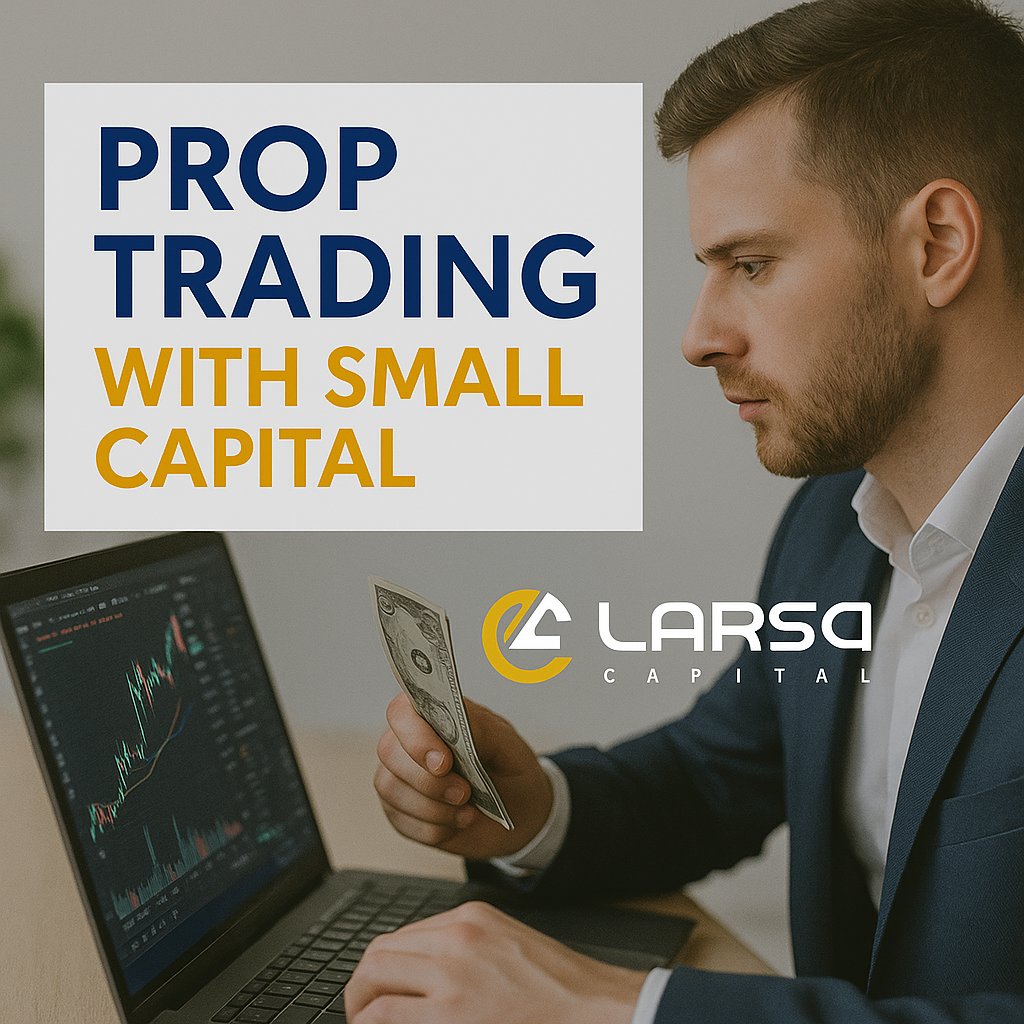Prop Trading with Small Capital: How to Start Prop Trading with No Capital
Understanding Prop Trading with Small Capital
The concept of prop trading with small capital has become a game-changer in modern financial markets. With the rise of proprietary trading firms, traders can now start with little to no capital while still accessing significant funding. This model allows aspiring traders to focus on performance rather than worrying about upfront investment.
In this blog, we’ll explore practical ways to get started in prop trading with small capital, break down how prop firms operate, and highlight how Larsa Capital supports this trading path.
What Is Prop Trading and Why Capital Isn’t Always Required
Proprietary trading involves trading financial assets using a firm’s capital instead of the trader’s own. The firm provides a funded account, while the trader earns a share of the profits.
Although traditional trading requires personal investment, many prop firms use evaluation models that assess skills before funding. Therefore, even traders with minimal capital can qualify for funding after proving their consistency.
Why Prop Trading with Small Capital Is Possible Today
Thanks to digital access and scalable funding models, it’s entirely possible to start prop trading with limited funds. Key industry trends making this possible include:
- Remote evaluations: Challenges and verification phases that allow traders to qualify from home.
- Low-cost assessments: Many programs cost as little as $50 to $200 to join.
- Performance-based access: No credit checks or collateral—just consistent trading.
At Larsa Capital, traders are evaluated based on merit and discipline. No massive initial deposit is needed.
Paths to Start Prop Trading with Small Capital
1. Enroll in a Low-Cost Evaluation Program
Most prop firms offer affordable entry evaluations. These typically include a simulated environment where traders must hit performance targets without violating drawdown rules. Once completed, traders receive access to real capital.
Key Benefits:
- Affordable entry (typically under $200)
- Quick access to a funded account upon success
- No need for large personal investments
2. Use Free Trial Accounts to Practice
Some firms offer free trial versions of their evaluation phases. While these don’t lead to funding, they can help build the skillset required to pass a paid challenge later.
Advantages:
- Zero risk
- Valuable practice under real conditions
- Builds confidence before spending money
3. Start with Demo Competitions
Competitions hosted by prop firms reward top-performing demo traders with funded accounts. These are highly competitive but offer a zero-cost entry point for skilled individuals.
Advantages:
- Zero upfront cost
- Competitive learning environment
- Potential direct access to funding
4. Consider Revenue-Share Referrals
Certain platforms offer affiliate programs where traders can refer others and earn a commission. Some use this income to cover challenge fees and start trading.
Prop Trading with Small Capital: Mindset and Discipline Are Key
Having small capital doesn’t mean you’re at a disadvantage. On the contrary, many firms look for disciplined, patient traders. Here’s how mindset plays a crucial role:
- Risk management: Always follow drawdown limits
- Strategy over luck: Focus on consistent setups
- Psychological control: Avoid revenge trades and emotional decisions
Success in prop trading comes down to quality over quantity. At Larsa Capital, traders are supported with transparent rules and fair evaluations.
Choosing the Right Evaluation Program
When you have limited capital, choosing the right evaluation matters. Evaluate these factors:
- Profit target difficulty
- Drawdown rules
- Minimum trading days
- Refundable fees (if any)
- Customer support quality
Larsa Capital excels in balancing these requirements, offering a trader-friendly environment.
What to Avoid When Starting with Small Capital
- Overleveraging: Don’t take oversized positions in hopes of quick wins.
- Emotional decisions: Stick to your trading plan.
- Skipping rules: Every prop firm has specific guidelines—read them thoroughly.
- Chasing too many firms: Focus on one evaluation at a time.
Long-Term Growth from Small Beginnings
You can start small and still grow significantly in the prop trading world. Here’s how:
- Reinvest profits: Use earnings to access larger accounts
- Use scaling plans: Some firms offer account increases for consistent traders
- Specialize: Focus on specific asset classes and strategies
With consistent effort and a sound plan, many traders move from small capital to managing six-figure accounts.
Realistic Expectations for New Traders
Let’s clarify some common misconceptions:
- You won’t make $10,000 overnight.
- It might take multiple attempts to pass evaluations.
- Every funded account comes with rules—success depends on respecting them.
But if you stay committed and learn from each step, the payoff is worth it.
Final Thoughts: Build Skill, Not Just Capital
Starting prop trading with small capital is more accessible than ever, but it still requires preparation, discipline, and the right platform. Focus on your trading edge, invest in the learning process, and choose firms that genuinely support traders—like Larsa Capital.
Even with limited funds, the doors to trading success are wide open.
Ready to start your journey with no capital?
Join Larsa Capital’s evaluation today and turn your skills into funding.

